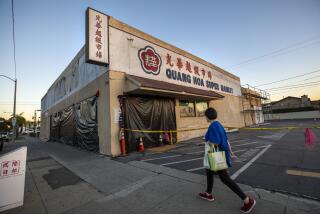Chinese travelers get cold feet
- Share via
SHANGHAI — It would have been one of the biggest tour-group catches of the year for California: Some 500 employees of a Beijing outsourcing company going on an 11-day excursion to Los Angeles and San Francisco, with a side trip to the Mexican coastal town of Ensenada.
But the outbreak of swine flu quickly put an end to those summer plans. Workers at China International Intellectech Corp. are now looking at Europe, said Yu Hui, a manager at Beijing U-Tour International Travel Service, which had prepared the so-called incentive trip for the company.
“I’m very worried right now,” Yu said, noting that four other groups destined for California and other parts of the U.S. had canceled because of swine flu. Even Chinese headed for remote Alaska are putting their plans on ice, she said.
Cancellations and postponements from travelers bound for Mexico, the epicenter of the virus outbreak, have been coming from all over the world in the last week. Now the disease is starting to hurt tourism in the U.S. And with the first confirmed death from swine flu in the U.S. -- a 22-month-old Mexican infant in Texas -- the economic toll is likely to get worse.
The specter of losing more Chinese tourists is particularly worrisome for California. Visitors from China account for the fastest-growing segment of the state’s multibillion-dollar tourism industry. It had been one of the bright spots in an otherwise gloomy economy, and state officials were hoping that tourism could drive a recovery.
Early last month, California officials were in China for the formal opening of three tourism offices, part of a big push to tap Chinese consumers’ growing wealth and penchant for seeing the world.
But to many Chinese, the photos and video footage of Americans wearing masks have conjured images of the 2003 epidemic of severe acute respiratory syndrome, or SARS, giving even those with wanderlust a case of cold feet.
Jamie Lee of the Los Angeles Convention and Visitors Bureau in China said several dozen Chinese who had made plans to attend the Los Angeles Film Festival in June had backed out. If swine flu cases keep piling up -- more than 160 have been confirmed in the United States -- Lee fears the Chinese government will issue a travel warning for the U.S., as it already has for Mexico. That could prove devastating, she said.
American hotels and tour operators only recently began to build a little momentum in China after Beijing and Washington last year lifted a ban on leisure group travel to the U.S. The agreement allows tour companies in China, for the first time, to market trips to America.
And few places are as well known and popular as Los Angeles and San Francisco. Last year roughly half a million Chinese visited the United States, and about 275,000 of them stayed in California.
Since opening its branch in Beijing a year ago, Ming International Travel Service in Los Angeles hasn’t seen the kind of rapid growth it had hoped for, said Bai Ming, a company representative in China. He blames it partly on the financial crisis. Still, Ming International is now sending about 200 Chinese tourists to the U.S. every month. And the peak season for Chinese travelers -- September and October -- has yet to come this year.
“Of course we are worrying and feel very anxious,” he said.
That sums up the feelings of Liang Jian, general manager of Total America, a Beijing agency specializing in U.S. package tours. Liang said he hadn’t received any cancellations. But some of his corporate customers have demanded that Total America provide masks and increase travel insurance for every participant.
Liang believes that the Chinese are more gung-ho travelers than, say, Japanese tourists, who are known for being highly risk-averse. Still, he says, if swine flu spreads, all bets are off.
After the country’s experience with SARS, Chinese consumers wouldn’t hesitate to pull the plug on a long-planned trip to America, he said. “Once they feel the situation is getting worse, they will cancel their trip right away.”
--
Cao Jun in The Times’ Shanghai bureau contributed to this report.
More to Read
Sign up for The Wild
We’ll help you find the best places to hike, bike and run, as well as the perfect silent spots for meditation and yoga.
You may occasionally receive promotional content from the Los Angeles Times.







